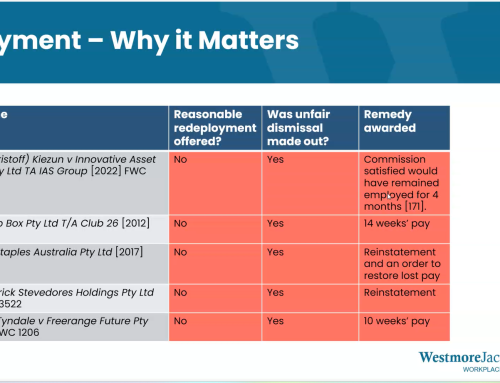
Introduction
COVID-19 resulted in many changes. Knowledge workers working from home (WFH) is probably one of the more enduring and contentious.
During COVID, WFH was heralded as a once in a generation change that would give employees the flexibility they need to balance work and life. For employers, it was a two-edged sword. Potential loss of managerial control and oversight coupled with reduced collaboration between staff presented unique challenges. On the upside, employers could employ the best, wherever they reside. Many employers also took the opportunity to reassess their office space needs, often resulting in cost savings.
Fast-forward nearly 4 years post COVID, employers appear to be more assertive about where their staff work. Many return-to-office-mandates have been implemented both here and overseas, often imposing a minimum number of days employees must work in the office.
The arguments for and against WFH are well known. Rather than adding to this debate, we will explore the growing legal implications of WFH in Australia. Our focus? Avoiding legal icebergs. In doing so, we hope to answer the question of whether working from home is here to stay.
A changing picture
The WFH landscape in Australia has been continually evolving since the COVID-19 pandemic. In March 2020, a temporary provision allowing WFH arrangements was added to the Clerks – Private Sector Award 2020 (Clerks Award).[1] This temporary arrangement came to an end in June 2021.[2]
The subsequent case law has illustrated the complexities surrounding remote work arrangements. In December 2021, the Queensland Industrial Relations Commission highlighted that an employee’s working adjustment needed to be balanced with the operational requirements of the employer.[3] This sentiment was echoed in August 2022, when that Commission ruled a WFH request that increased the workload on co-workers was not reasonable.[4]
As the legal landscape continued to evolve, the Federal Court of Australia in February 2023 brought clarity in a decision that emphasised there was no inherent right or entitlement to WFH.[5] This case highlighted the importance of parties’ agreements that may explicitly require a person’s attendance on site.[6] This perspective was further reinforced in August 2023, when the Federal Circuit and Family Court of Australia concluded that the case law does not support a general right for employees to choose to work from home at their discretion.[7]
As we look ahead to 2024 and beyond, discussions are underway about potentially amending the Clerks Award to formally include a WFH provision. Before we discuss this likely change, it is necessary to first discuss the existing legal obstacles employers must navigate to address an employee’s preference to work from home.
Navigating legal icebergs
Addressing an employee’s preference to work from home involves navigating at least five legal obstacles:
- Whether an employer can issue a lawful and reasonable instruction to work at the office;
- The right to request flexible arrangements under the National Employment Standards (NES);
- The necessity for employers to justify refusals of these requests based on reasonable business grounds;
- Compliance with discrimination and general protections laws that protect employees with specific attributes; and
- The obligation to make reasonable adjustments for employees with disabilities, which can lead to potential discrimination claims if not accommodated.
Below we focus on the right to request WFH under the NES and protections afforded under discrimination laws.
The NES provides eligible employees the right to request flexible working arrangements, including the possibility of working from home. However, employers can refuse these requests on reasonable business grounds, provided they justify their decision based on legitimate operational needs. The Fair Work Commission has powers to arbitration disputes.
The case law regarding flexible working arrangements has developed relatively quickly. Amongst other things, the Fair Work Commission has emphasised the need for a nexus to exist between the flexibility request (such as WFH) and the employee’s attribute (i.e., their circumstances). Requesting to work from home because one is over 55 years old is, of itself, not enough to create a WFH right.
Turning to discrimination laws, both Federal and Victorian laws can protect employees from return-to-office mandates. Employees must have a protected attribute, such as having a disability or carer responsibilities, to invoke these protections. A poorly worded return-to-office mandate that an employee cannot meet due to a protected attribute quickly creates risks of breaching anti-discrimination laws, particularly through indirect discrimination.
The new legal icebergs ahead
Following the Modern Awards Review 2023-24, the Fair Work Commission initiated a case to develop a work-from-home term for the Clerks Award. This Award has been identified as the most commonly used framework for WFH arrangements, with around 42% of clerical and administrative workers regularly working from home compared to employees across all occupations.[8]
The Full Bench observed a WFH term “may serve as a model” for incorporation into other Awards.[9] But, it acknowledged the term is “not relevant to all industries or modern awards”,[10] and no common position has yet been reached on the specific form a WFH provision should take.[11]
As the Commission moves forward, it is tasked with considering a range of important issues. This includes:
- How should ‘working from home’ be defined?
- Would an appropriate ‘working from home’ term include a right for employees to request working-from-home arrangements?
- How will working overtime be authorised and recorded if WFH?
- How would a WFH term interact with the right to disconnect?
Slow burn
Given these complexities, the process is expected to be a “slow burn”. During the directions hearing on 13 September 2024, employer advocates indicated they would not be able to file necessary materials until March 2025, signaling a lengthy timeline ahead. This will likely culminate in a hearing next June, possibly following an employer survey. In the meantime, advocates have emphasised the need to address privacy, surveillance and safety concerns as the Commission navigates these competing considerations. Balancing employee flexibility with essential operational and legal safeguards will no doubt be a significant challenge for the Commission.
As this slow process unfolds, employers will need to prepare for the implications of any new provisions that may arise.
Conclusion
In our view, it appears likely WFH is likely here to stay from a legal perspective. While there is currently no overarching legal right to WFH, we expect the law will develop and a WFH term to be inserted into the Clerks Award. As the law continues to evolve, especially regarding anti-discrimination cases, employers should stay vigilant about emerging risks.
Experience tells us that employers with robust employment contracts who seek advice early for high-risk matters will be best placed to navigate the legal icebergs ahead.
Adam Colquhoun (Principal) and Jolin Chao (Law Clerk)
This article is general information only. It is not legal advice. If you need legal advice, please contact us.
Citations:
[1] [2020] FWCFB 1690
[2] [2020] FWCFB 3653
[3] Hair v State of Queensland (Queensland Health) [2021] QIRC 422 (10 December 2021) [93].
[4] Petrie v State of Queensland (Queensland Mental Health Commission) [2022] QIRC 343 (31 August 2022) [23].
[5] Ponraj v Wycom Services [2023] FCA 118 [102].
[6] Ibid.
[7] Homes v Australian Carers Pty Ltd (No 2) [2023] FedCFamiC2G 714 [22].
[8] Fair Work Commission, Work and Care (Data Profile, 28 March 2024) 6.
[9] Fair Work Commission, Variation on the Commission’s own initiative Clerks Private Sector Award 2020 (Statement, 29 August 2024) page 1.
[10] Fair Work Commission, Final Report – Modern Awards Review 2023-24 (Report, 18 July 2024) [102].
[11] Ibid [107].





